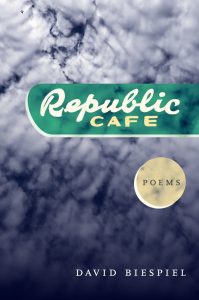Book Review
I read David Biespiel’s Republic Café at the start of 2020, just as the relationships between the United States and Iran and Iraq were again thrown into turmoil following the killing of Iranian military leader Qasem Soleimani. As the world awaited Iran’s response, Ilya Kaminsky’s poem “We Lived Happily During the War,” which opens his 2019 collection Deaf Republic, went viral on social media. People were quoting Iranian-American poets like Solmaz Sharif and Kaveh Akbar alongside dire jokes about World War III. In a time of crisis, we were looking—as we often do—to poetry. Republic Café, Biespiel’s sixth poetry collection, takes place in the days following a crisis in our not-so-distant past, the September 11, 2001 attacks by al-Qaeda on the United States. The speaker of these poems is living in Manhattan during the attacks, and he witnesses their immediate aftermath. He refers to the book he is writing as “a journal about the corpses of war.” The poems in Republic Café are numbered rather than titled, although they do not proceed chronologically. In this way, the collection embodies the splintering that the memory and threat of violence do to our consciousness, on both a global and personal scale.
Biespiel grapples with global crisis through the lens of the individual—specifically the relationship between two lovers. It’s a particularly affecting lens to adopt given that individual nihilism is a practically universal response to systemic crises like climate change, poverty, famine, and the potential for nuclear holocaust. And in case that list didn’t make it clear, we are living in a time perhaps defined by systemic crises. Nevertheless, we are not the first to do so:
When the fish died after Hiroshima,
They were lined up by the silvery thousands and had to be thrown into the dump.
When the fish died, fear became an object one couldn’t bury.
When the fish died, no one was thinking of ideas.
An earlier poem in which Biespiel likens the September 11 attacks (nearly three thousand dead and over six thousand injured) to the 1945 bombings of Hiroshima and Nagasaki (over two hundred thousand killed immediately or as a result of exposure to radiation) ends: “Later, the love of being / Followed by a stain.” It is not that the speaker’s “love of being” itself is stained, but precedes a stain. The collection alternates between these two states; the juxtaposition at the heart of Republic Café is the intimacy between two lovers in a room in a country at war. What good is our love, they ask, when the pattern of history indicates that another atrocity, another stain will follow? What good is wanting to love, or wanting our children to love, or sunshine, or wanting the sun to shine upon us and our children?
Biespiel also incorporates the realities of the American Civil War (six hundred thousand soldiers dead) by way of Walt Whitman, the Holocaust (nearly six million Jews killed across Europe), and even more ancient times of war: “Just as when Hannibal arrives in triumph in Rome with the avenues deserted and the weeds undefeated, / Through Times Square, a police escort of semis with digging equipment on flatbeds arrives from the iron mines of Minnesota.” The stain that follows recalls all the many stains before. In another poem, the speaker sees “a man’s face star[ing] out of the newsreel” from some anonymous war, and wonders, “Wasn’t it worth it, I suppose he thinks, to have once had his heart broken?” We look to quotidian intimacy, through which Biespiel’s poems come alive, to justify having these hearts within us, even after they’ve been broken.
Inevitably, the stain of atrocity begins to mix in with the love, emerging first inside the vocabulary of intimacy. The narrative of the lovers interweaves with so many wars. To look at and faithfully record both demonstrates the speaker’s courage. In conversation with his lover, he insists:
To be shorn of the past, I say, is to believe that each previous love was a mistake.
Everyone forgets—I say, leaning forward in a chair
While you are standing near the window—
It’s like coming to the end of a triumph but seeing it as a failure.
From a small, quiet room, Biespiel’s speaker unravels a tale of enormity. For him, intimacy was always a force in the world weighing the cosmic scales against that of destruction. In one poem, the speaker is watching a film that takes place just as “Paris is liberated / And Hiroshima is again a living city,” giving us a scene in which a French woman undresses in front of her Japanese lover. The speaker narrates, “They have both survived, and their pain with their joy is who they have become.” To be open to joy, one must also be vulnerable to pain. Both survive, as two lovers going out into the daylit world. The room and the poems that housed their intimacy are more triumph than failure, but—like day and night—we find ourselves returning to both. Republic Café calls the liminal space we straddle in times of crisis home, out of necessity as well as courage.
About the Reviewer
Katherine Indermaur is the author of the chapbook Pulse (Ghost City Press, 2018), winner of the Black Warrior Review 2019 Poetry Contest and the 2018 Academy of American Poets Prize, and editor for Sugar House Review. Her writing has appeared or is forthcoming in Bad Pony, Coast|NoCoast, Entropy, Frontier Poetry, Ghost Proposal, the Hunger, New Delta Review, Oxidant|Engine, and elsewhere. She holds a BA from UNC-Chapel Hill and an MFA from Colorado State University. She lives in Salt Lake City. More at katherineindermaur.com.
